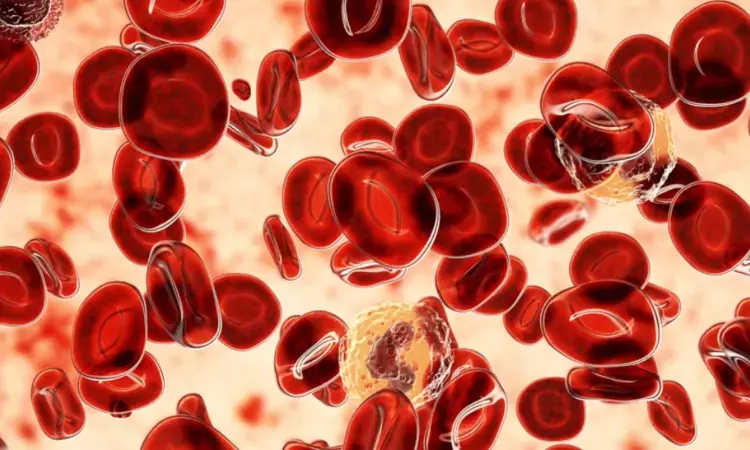- Home
- Medical news & Guidelines
- Anesthesiology
- Cardiology and CTVS
- Critical Care
- Dentistry
- Dermatology
- Diabetes and Endocrinology
- ENT
- Gastroenterology
- Medicine
- Nephrology
- Neurology
- Obstretics-Gynaecology
- Oncology
- Ophthalmology
- Orthopaedics
- Pediatrics-Neonatology
- Psychiatry
- Pulmonology
- Radiology
- Surgery
- Urology
- Laboratory Medicine
- Diet
- Nursing
- Paramedical
- Physiotherapy
- Health news
- Fact Check
- Bone Health Fact Check
- Brain Health Fact Check
- Cancer Related Fact Check
- Child Care Fact Check
- Dental and oral health fact check
- Diabetes and metabolic health fact check
- Diet and Nutrition Fact Check
- Eye and ENT Care Fact Check
- Fitness fact check
- Gut health fact check
- Heart health fact check
- Kidney health fact check
- Medical education fact check
- Men's health fact check
- Respiratory fact check
- Skin and hair care fact check
- Vaccine and Immunization fact check
- Women's health fact check
- AYUSH
- State News
- Andaman and Nicobar Islands
- Andhra Pradesh
- Arunachal Pradesh
- Assam
- Bihar
- Chandigarh
- Chattisgarh
- Dadra and Nagar Haveli
- Daman and Diu
- Delhi
- Goa
- Gujarat
- Haryana
- Himachal Pradesh
- Jammu & Kashmir
- Jharkhand
- Karnataka
- Kerala
- Ladakh
- Lakshadweep
- Madhya Pradesh
- Maharashtra
- Manipur
- Meghalaya
- Mizoram
- Nagaland
- Odisha
- Puducherry
- Punjab
- Rajasthan
- Sikkim
- Tamil Nadu
- Telangana
- Tripura
- Uttar Pradesh
- Uttrakhand
- West Bengal
- Medical Education
- Industry
Rusfertide effective for controlling RBCs overproduction in polycythemia vera: NEJM

USA: A recent multi-centre clinical trial published in the New England Journal of Medicine has shed light on the efficacy and safety of rusfertide, a hepcidin mimetic, in patients with phlebotomy-dependent polycythemia vera.
Marina Kremyanskaya, Tisch Cancer Institute, Icahn School of Medicine at Mount Sinai, New York, NY, and colleagues revealed that in patients with polycythemia vera, rusfertide treatment was linked with a mean hematocrit of less than 45% during the 28-week dose-finding period, and during the 12-week randomized withdrawal period, percentage of patients with a response was greater with rusfertide than with placebo.
"A novel treatment for polycythemia vera, a potentially fatal blood cancer, demonstrated the ability to control the overproduction of red blood cells, the hallmark of this malignancy and many of its debilitating symptoms," the researchers reported.
Polycythemia vera is a chronic myeloproliferative neoplasm characterized by erythrocytosis. Rusfertide is an injectable peptide mimetic of the master iron regulatory hormone hepcidin, which restricts the availability of iron for erythropoiesis. There is no information on the efficacy and safety of rusfertide in patients with phlebotomy-dependent polycythemia vera.
The researchers enrolled patients in a 28-week dose-finding assessment of rusfertide in part 1 of the international, phase 2 REVIVE trial. Part 2 was a double-blind, randomized withdrawal period in which patients were assigned 1:1 to receive rusfertide or placebo for 12 weeks.
The primary efficacy endpoint was a response, defined by hematocrit control, phlebotomy absence, and completion of the trial regimen during part 2. Patient-reported outcomes were evaluated using the modified Myeloproliferative Neoplasm Symptom Assessment Form (MPN-SAF) patient diary (scores vary from 0 to 10, with higher scores indicating greater severity of symptoms).
The study led to the following findings:
- In part 1 of the trial, seventy patients were enrolled, and 59 were assigned to receive rusfertide (30 patients) or placebo (29 patients) in part 2. The estimated mean number of phlebotomies per year was 8.7±2.9 during the 28 weeks before the first dose of rusfertide and 0.6±1.0 during part 1 (estimated difference, 8.1 phlebotomies per year).
- The mean maximum hematocrit was 44.5±2.2% during part 1 as compared with 50.0±5.8% during the 28 weeks before the first dose of rusfertide.
- During part 2, a response was observed in 60% of the patients who received rusfertide as compared with 17% of those who received a placebo.
- Between baseline and the end of part 1, rusfertide treatment was associated with a decrease in individual symptom scores on the MPN-SAF in patients with moderate or severe symptoms at baseline.
- During parts 1 and 2, grade 3 adverse events occurred in 13% of the patients, and none of the patients had a grade 4 or 5 event.
- Injection-site reactions of grade 1 or 2 in severity were common.
“Rusfertide is a potentially effective treatment option for achieving and sustaining hematocrit control in polycythemia vera, reducing the use of phlebotomy and the occurrence of debilitating disease-related symptoms,” the researchers wrote.
"For patients with polycythemia vera, the hepcidin mimetic rusfertide, which restricts the availability of iron, might be effective for controlling erythrocytosis," they concluded.
Reference:
Kremyanskaya, M., et al. (2024) Rusfertide, a Hepcidin Mimetic, for Control of Erythrocytosis in Polycythemia Vera. New England Journal of Medicine. doi.org/10.1056/NEJMoa2308809.
Dr Kamal Kant Kohli-MBBS, DTCD- a chest specialist with more than 30 years of practice and a flair for writing clinical articles, Dr Kamal Kant Kohli joined Medical Dialogues as a Chief Editor of Medical News. Besides writing articles, as an editor, he proofreads and verifies all the medical content published on Medical Dialogues including those coming from journals, studies,medical conferences,guidelines etc. Email: drkohli@medicaldialogues.in. Contact no. 011-43720751


